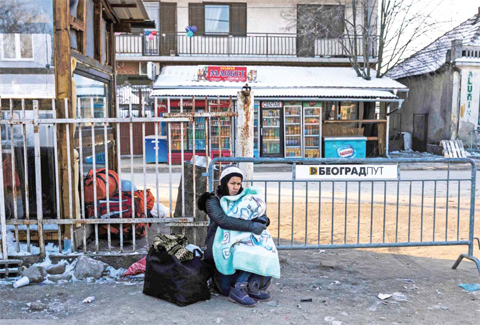 PRESEVO: A woman holds her baby as she waits with other migrants and refugees for a bus on January 20, 2016 at a registration camp in southern Serbian town of Presevo, after crossing the Macedonian border, as temperature fall to minus 15 Celsius. — AFP
PRESEVO: A woman holds her baby as she waits with other migrants and refugees for a bus on January 20, 2016 at a registration camp in southern Serbian town of Presevo, after crossing the Macedonian border, as temperature fall to minus 15 Celsius. — AFP
FRANKFURT: From an economic point of view, it all seemed to make sense. There are hundreds of thousands of job vacancies waiting to be filled in Germany and 1.5 million refugees arriving in Europe's biggest economy since 2012, many of whom are looking for work. But for many of the new arrivals, the all-important job qualifications that employers require in Germany are a major hurdle, coupled with the language barrier and the fact that frequently the more pressing need is simply to find enough money to live on.
Economists have long pointed out that with its ageing population and an ever-widening shortfall in qualified labor, Germany urgently needs immigrants if it wants to maintain its prosperity in the long term. The massive influx of the refugees seemed to offer a welcome opportunity to help fill, for example, the thousands of training places that remain vacant every year.
But few refugees are familiar with an "apprenticeship" system combining both on-the-spot vocational training and theoretical learning that almost every employer in Germany, from bakeries to multinational companies, adheres to, said Meike Al-Habash, head of vocational training at the IHK Chambers of Commerce Association in Berlin.
Both chambers of commerce and Germany's federal labor agency are increasing their efforts to raise awareness among young refugees of the importance of qualifications for entering the German labor market. But "in a lot of cases," the immigrants have "other priorities," said Juergen Wursthorn, a spokesman for the federal labor agency in Nuremberg.
"It is not rare for young people to arrive in Germany with the dream of quickly earning enough money to send back to their families," he said. "Not to mention those who have to repay the huge sums of money they owe to the smugglers who brought them over." Many of them therefore choose a job in the unqualified sector, simply to earn enough immediate cash, rather than go through the training process, which is very low paid.
'Deluding themselves'
"Those who opt for the easy solution are deluding themselves," argued Conrad Skerutsch, who heads a jobs advice centre in Frankfurt. "Only five-to-ten percent of asylum seekers" have a sufficient level of training to qualify them to work in their first year of arriving in Germany, Skerutsch said. And for the young refugees, who tend to be particularly well motivated, the traditional path of dual-system training is full of pitfalls, said Wursthorn.
"Around half of our refugee apprentices abandon their training part of the way through," said Rudolf Baier, spokesman for the HWK Chamber of Crafts in Munich, which oversees around 23,000 apprenticeships, including nearly 500 young asylum seekers. The failure rate is twice as high as normal, but has started to come down since the HWK created two new full-time positions for support workers, and tailor-made courses, to accompany the young refugee apprentices during their training.
The main obstacle
"The language, the language, the language," said Baier. "For a lot of them, the written exams are too difficult" because of their lack of German skills, he said. Nevertheless, in the southern region of Bavaria, around 5,500 apprenticeship places remain unfilled in the crafts trades sector and "refugees could help fill them," Baier insisted.
The situation is more complicated for older refugees. Despite their previous career experience, many of them "don't have any qualifications or any certificates," said Achim Dercks, co-head of the DIHK federation for chambers of commerce. They run the risk of ending up on unemployment benefit, like 20 percent of the unqualified workforce in Germany.
For older refugees, a number of schemes have been devised, such as part-time apprenticeships, already in place for young mothers, or more flexible training schemes offering a certificate at the end. "Everything is still very much in a test phase," Dercks said, insisting that "in the best-case scenario, at least five years" would be needed for the refugees to become integrated into the labor market.
According to a study undertaken in 2014 by the Federal Office for Migration and Refugees, and published on Monday, out of 2,800 asylum seekers who arrived in Germany between 2007 and 2012, only 37 percent had a job at the time of the study, and 23 percent were on unemployment benefit. - AFP




